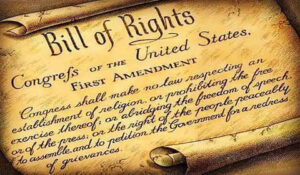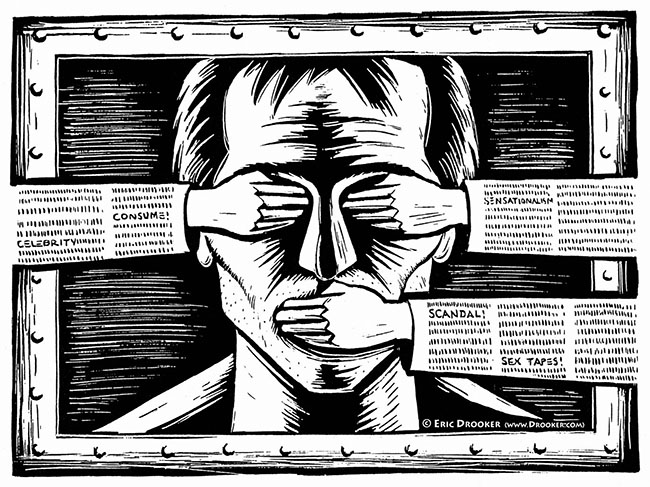The First Amendment of the United States Constitution guarantees, among other freedoms, the freedom of speech, press, religion, and assembly.
This fundamental pillar of the U.S. democratic system protects both those who wish to express their opinions and those who openly practice their faith or religion. However, in recent times, there have been growing criticisms about how some sectors of the left are eroding these freedoms, particularly towards people of faith. Additionally, it has been pointed out that the use of fact-checking is being employed to silence or delegitimize voices that differ from certain dominant narratives. Below, we will explore how this is happening and what implications it has for freedom of speech and religious freedom.
 Restricting speech in the name of political correctness
Restricting speech in the name of political correctness
One of the main arguments of those who believe that the left is attacking the First Amendment is the use of the concept of political correctness to silence or suppress speech that does not align with their values. While it is true that respecting different groups and fighting against hate and intolerance are noble causes, this effort has often resulted in censoring opinions that are not considered appropriate by certain standards. In many cases, those who hold traditional religious beliefs on topics such as marriage, sexuality, or life are labeled as “intolerant” or “discriminatory.”
For example, many religious groups have been criticized and censored on social media platforms for defending doctrines that have been part of their faith for centuries. Instead of fostering open debate, some platforms have chosen to remove posts or suspend accounts, claiming that these statements violate their “hate” policies, without considering that they are protected expressions under religious freedom.
The use of fact-checking as a tool of censorship
Another concerning trend is the use of fact-checking, a tool initially designed to combat misinformation, but which in some cases has been misused to delegitimize opinions that simply do not align with the dominant current. Often, these verifications do not limit themselves to correcting objective errors but focus on discrediting arguments or viewpoints that, while controversial, are based on religious beliefs or philosophical convictions.
A clear example of this is the discussions around topics like abortion or same-sex marriage. When people of faith argue against these practices based on their beliefs, they are often labeled as “spreaders of misinformation” or their opinions are presented as “false” in fact checks, even though they are expressing a moral or philosophical point of view, not necessarily a false or incorrect fact. This strategy turns fact-checking into a tool for delegitimizing certain opinions, rather than an impartial way of verifying objective facts.
Religious freedom under threat
The attack on freedom of speech is not limited only to the realm of opinions but has also begun to directly affect religious freedom. In several recent cases, religious institutions and faith leaders have been subjected to lawsuits or sanctions for adhering to their beliefs on controversial issues. A notable case is that of religious business owners who have refused to provide certain services, such as participation in same-sex marriage ceremonies, due to their religious beliefs. Instead of respecting their right to act according to their faith, these people have faced lawsuits accusing them of discrimination, even though their refusal was not motivated by hate but by religious principles.
Moreover, several recent laws and regulations have been criticized for attempting to impose a secular view of morality, forcing individuals and religious organizations to act against their beliefs. This not only represents a direct attack on religious freedom but also sends the message that religious beliefs are less worthy of protection than other forms of expression.
The debate over “truth”
Part of the problem lies in the contemporary notion of “truth.” While in the past, freedom of speech allowed for a plurality of voices and the coexistence of different interpretations of reality, today, a more rigid view is being imposed, in which only certain viewpoints are considered valid or true. This has led to the term “misinformation” being broadly applied to include not only factually incorrect statements but also any speech that differs from the prevailing narrative. Thus, public debate is stifled, and important voices, including those of people of faith who, from their perspective, believe they are defending the truth, are excluded.
A clear example of this is the way certain scientific or social debates are handled in the public sphere. Issues about biological differences between sexes, the origin of life, or medical ethics are constantly labeled as “denialism” or “hate speech,” even when those defending these positions are basing their arguments on their religious convictions. By censoring these voices, not only is freedom of expression limited, but public debate is also distorted, depriving it of the richness that comes from the diversity of opinions.
Consequences for democracy
The danger of these trends is that they erode one of the fundamental principles of democracy: the free exchange of ideas. Freedom of speech and religious freedom are complementary rights that allow pluralistic societies to flourish. By attacking these freedoms, there is a risk of creating a society where only a select group of opinions has a place in public debate, while others are systematically marginalized or silenced.
This is particularly serious in a nation like the United States, where the First Amendment has long been a symbol of individual freedoms. While it is necessary to combat hate and misinformation, it is equally crucial that these initiatives do not become excuses to censor or attack religious beliefs and dissenting opinions. The challenge lies in finding a balance that allows for the coexistence of different viewpoints and ensures that all citizens, regardless of their beliefs, can express their opinions freely.
Freedom of expression and religion is under attack, especially from sectors of the left that, in the name of political correctness and the fight against disinformation, use “fact-checking” to silence dissenting voices. This puts public discourse and democratic values at risk. To protect democracy, it is crucial to defend everyone’s right to express themselves without fear of being censored or delegitimized.



